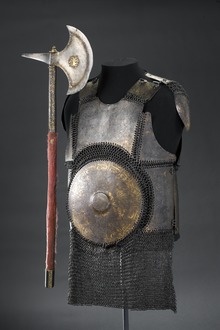секира
Appearance
See also: сѣкꙑра
Bulgarian
[edit]Etymology
[edit]From Proto-Slavic *sekyra, related to сека (seka, “to cut”).
Pronunciation
[edit]Noun
[edit]секи́ра • (sekíra) f
Declension
[edit]| singular | plural | |
|---|---|---|
| indefinite | секи́ра sekíra |
секи́ри sekíri |
| definite | секи́рата sekírata |
секи́рите sekírite |
Anagrams
[edit]Macedonian
[edit]Etymology 1
[edit]Inherited from Proto-Slavic *sekyra.
Pronunciation
[edit]Noun
[edit]секира • (sekira) f (plural секири, diminutive секирче or секирица)
Declension
[edit]| singular | plural | |
|---|---|---|
| indefinite | секира (sekira) | секири (sekiri) |
| definite unspecified | секирата (sekirata) | секирите (sekirite) |
| definite proximal | секирава (sekirava) | секириве (sekirive) |
| definite distal | секирана (sekirana) | секирине (sekirine) |
| vocative | секиро (sekiro) | секири (sekiri) |
Etymology 2
[edit]Pronunciation
[edit]Verb
[edit]секира • (sekira) third-singular present, impf (perfective насекира)
- (transitive) to worry, aggrieve
Conjugation
[edit]Conjugation of секира (imperfective, present in -а)
| l-participles | imperfect | aorist | non-finite forms | |||
|---|---|---|---|---|---|---|
| masculine | секирал | — | adjectival participle | секиран | ||
| feminine | секирала | — | adverbial participle | секирајќи | ||
| neuter | секирало | — | verbal noun | секирање | ||
| plural | секирале | — | perfect participle | секирано | ||
| present | imperfect | aorist | imperative | |||
| 1st singular | секирам | секирав | — | — | ||
| 2nd singular | секираш | секираше | — | секирај | ||
| 3rd singular | секира | секираше | — | — | ||
| 1st plural | секираме | секиравме | — | — | ||
| 2nd plural | секирате | секиравте | — | секирајте | ||
| 3rd plural | секираат | секираа | — | — | ||
| Compound tenses | ||||||
| perfect | сум секирал | present of сум (except in the 3rd person) + imperfect l-participle | ||||
| има-perfect | имам секирано | present of има + perfect participle | ||||
| pluperfect | бев секирал | imperfect of сум + imperfect l-participle | ||||
| има-pluperfect | имав секирано | imperfect of има + perfect participle | ||||
| има-perfect reported | сум имал секирано | perfect of има + perfect participle | ||||
| future | ќе секирам | ќе + present | ||||
| има-future | ќе имам секирано | future of има + perfect participle | ||||
| future in the past | ќе секирав | ќе + imperfect | ||||
| има-future in the past | ќе имав секирано | future in the past of има + perfect participle | ||||
| future reported | ќе сум секирал | ќе + imperfect l-participle | ||||
| има-future reported | ќе сум имал секирано | future reported of има + perfect participle | ||||
| conditional | би секирал | би + imperfect l-participle | ||||
| има-conditional | би имал секирано | conditional of има + perfect participle | ||||
Russian
[edit]
Etymology
[edit]Inherited from Old East Slavic секꙑра (sekyra), from Proto-Slavic *sekyra, related to сечь (sečʹ, “to cut”).
Pronunciation
[edit]Noun
[edit]секи́ра • (sekíra) f inan (genitive секи́ры, nominative plural секи́ры, genitive plural секи́р)
- any kind of battle-axe on a long haft and with a broad half-moon blade
- (archaic or dialectal) axe
- секи́ра Перуна́ ― sekíra Peruná ― the axe of Perun
Declension
[edit]Declension of секи́ра (inan fem-form hard-stem accent-a)
Coordinate terms
[edit]- топо́р (topór) (modern, for any axe)
Serbo-Croatian
[edit]Alternative forms
[edit]Etymology
[edit]Inherited from Proto-Slavic *sekyra.
Pronunciation
[edit]Noun
[edit]сѐкира f (Latin spelling sèkira)
Declension
[edit]Declension of секира
Derived terms
[edit]Categories:
- Bulgarian terms inherited from Proto-Slavic
- Bulgarian terms derived from Proto-Slavic
- Bulgarian terms with IPA pronunciation
- Bulgarian lemmas
- Bulgarian nouns
- Bulgarian feminine nouns
- bg:Tools
- Macedonian terms inherited from Proto-Slavic
- Macedonian terms derived from Proto-Slavic
- Macedonian 3-syllable words
- Macedonian terms with IPA pronunciation
- Macedonian proparoxytone terms
- Macedonian terms with audio pronunciation
- Macedonian lemmas
- Macedonian nouns
- Macedonian feminine nouns
- Macedonian paroxytone terms
- Macedonian verbs
- Macedonian imperfective verbs
- Macedonian transitive verbs
- Macedonian verbs in -а
- mk:Tools
- mk:Weapons
- Russian terms derived from Proto-Indo-European
- Russian terms derived from the Proto-Indo-European root *sek-
- Russian terms inherited from Old East Slavic
- Russian terms derived from Old East Slavic
- Russian terms inherited from Proto-Slavic
- Russian terms derived from Proto-Slavic
- Russian 3-syllable words
- Russian terms with IPA pronunciation
- Russian lemmas
- Russian nouns
- Russian feminine nouns
- Russian inanimate nouns
- Russian terms with archaic senses
- Russian dialectal terms
- Russian terms with usage examples
- Russian hard-stem feminine-form nouns
- Russian hard-stem feminine-form accent-a nouns
- Russian nouns with accent pattern a
- ru:Weapons
- Serbo-Croatian terms inherited from Proto-Slavic
- Serbo-Croatian terms derived from Proto-Slavic
- Serbo-Croatian terms with IPA pronunciation
- Serbo-Croatian lemmas
- Serbo-Croatian nouns
- Serbo-Croatian feminine nouns
- sh:Tools
